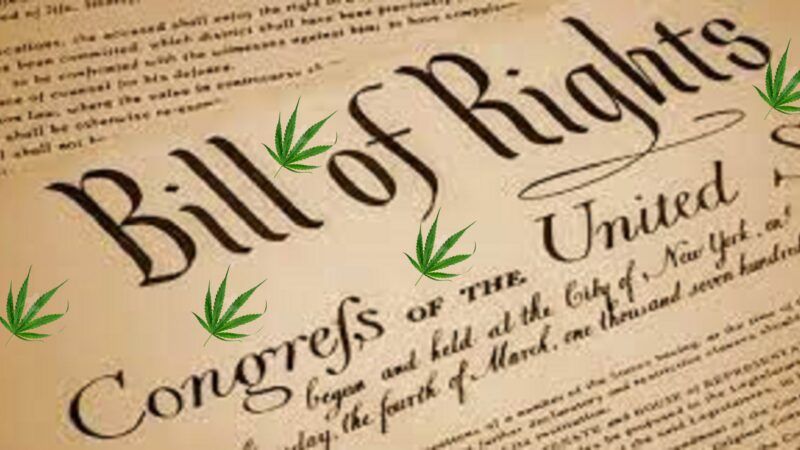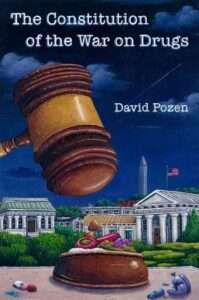

The Constitution of the War on Drugs , by David Pozen, Oxford University Press, 304 pages, $27.95
When the Supreme Court overturned Roe v. Wade in 2022, Justice Samuel Alito's majority opinion mocked "attempts to justify abortion" by asserting "a broader right to autonomy." After all, he wrote in Dobbs v. Jackson Women's Health Organization, that concept "could license fundamental rights to illicit drug use, prostitution, and the like." Alito thought it was obvious that "none of these rights has any claim to being deeply rooted in history."
Alito's blithe dismissal of a fundamental right to consume psychoactive substances reflects "constitutional amnesia," Columbia law professor David Pozen argues in The Constitution of the War on Drugs . It overlooks both the controversy provoked by the nation's early anti-drug laws and the hope inspired by subsequent legal assaults on prohibition. All of those challenges ultimately fizzled. But Pozen sees promise in "a model of rights review known as proportionality ," which asks whether the burdens imposed by the drug war are commensurate with the corresponding benefits.
While some foreign courts have embraced that approach, it probably would not make much headway in U.S. courts, partly because it blurs the line between judges and legislators. Pozen's book nevertheless makes an important contribution to the drug policy debate by reminding us of the history that Alito ignored.

Alito was assessing the scope of the 14th Amendment, which bars states from abridging "the privileges or immunities of citizens." Although that clause is the most historically plausible source of rights that states must respect, the Supreme Court has instead relied on the amendment's command that states may not "deprive any person of life, liberty, or property, without due process of law." In applying restrictions to the states, the Court typically has resorted to "substantive due process," which encompasses rights that are "fundamental to our scheme of ordered liberty" or "deeply rooted in this Nation's history and tradition." Those rights include but are not limited to rights explicitly recognized in the first eight amendments.
Applying that test to abortion rights, Alito cited "the unbroken tradition of prohibiting abortion on pain of criminal punishment" prior to 1973. Leaving aside the accuracy of that gloss, anti-drug laws clearly do not have such a pedigree. When the 14th Amendment was ratified in 1868, state-level alcohol prohibition was a recent experiment that was legally contentious and generally deemed a failure. Americans were free to buy and consume drugs that are now "controlled substances" without a prescription, a situation that persisted into the early 20th century. "For the first 100 years of the nation," the longtime marijuana activist Dale Gieringer noted in response to Alito's scoffing, "the right to use drugs was taken for granted."
That sentiment was still prevalent in the late 19th and early 20th centuries. "If you asked a typical lawyer at the turn of the twentieth century whether the government could ban the possession or consumption of an intoxicant like alcohol, the answer would have been no," Pozen writes. "The federal government couldn't do so, it was understood at the time, because the 'police power' to regulate in the interest of public health, safety, and welfare had been reserved by the Constitution to the states." And although "state governments had broad discretion to legislate under their police power," Pozen notes, "many courts" held that such laws "must not interfere with purely private behavior."
In 1887, when the California Supreme Court blocked enforcement of a local ordinance that prohibited gatherings for the purpose of smoking opium, the majority opinion reflected that view, although it was not decisive in the outcome. "To prohibit vice is not ordinarily considered within the police power of the state," Justice Jackson Temple wrote. "Such legislation is very rare in this country. There seems to be an instinctive and universal feeling that this is a dangerous province to enter upon, and that through such laws individual liberty might be very much abridged."
In 1909, Pozen notes, the Kentucky Court of Appeals overturned "a conviction for bringing booze into a dry town." It is "not within the competency of government," the court said, "to invade the privacy of the citizen's life and to regulate his conduct in matters in which he alone is concerned, or to prohibit him any liberty the exercise of which will not directly injure society."
Such objections eventually gave way to state legislators' insistence that protecting "society" required them to "prohibit vice." Resistance to federal drug legislation took longer to overcome. Such laws initially were dressed up as revenue measures or, in the case of alcohol prohibition, authorized by constitutional amendment. Legislators dropped the tax pretense after the Supreme Court interpreted the power to regulate interstate and foreign commerce broadly enough to accommodate pretty much anything Congress wanted to do. As Pozen notes, that "New Deal settlement" proved to be a tradeoff for progressives who generally welcome economic regulation but object to the specific variety that drug prohibition entails.
Drug war dissenters attempted other strategies, such as claiming that the right to use drugs is part of a constitutionally protected right to privacy. That approach seemed promising after the Supreme Court's 1965 decision in Griswold v. Connecticut , which rejected a state ban on contraception. Griswold "recognized a new constitutional right of privacy and resurrected the protection of substantive liberty interests without a clear basis in the constitutional text," Pozen observes. And four years later in Stanley v. Georgia , the Supreme Court "recognized a right to possess and consume obscene material in one's home," even though it had said production and distribution of such material is not protected by the First Amendment.
Citing those two cases, former Supreme Court Justice Tom Clark suggested in a 1972 law review article that the Court "might find it difficult to uphold a prosecution for [marijuana] possession." But the privacy argument yielded no lasting victories against the drug war, with the notable exception of the Alaska Supreme Court's 1975 ruling in Ravin v. State , which held that possessing small amounts of marijuana at home for personal use was protected by the state constitution's explicit privacy guarantee.
The story of initial excitement followed by disappointment was repeated with other constitutional attacks on drug laws. Lawyers and academics offered arguments based on equal protection, freedom of speech, freedom of religion, and the Eighth Amendment's prohibition of "cruel and unusual punishments."
Equal protection claims were stymied by toothless "rational basis" review of distinctions that do not involve "suspect classes" and by the intent requirement for proving racial discrimination. As with privacy, there was a conspicuous state court exception: In 1991, the Minnesota Supreme Court ruled that the state's penal distinction between the smoked and snorted forms of cocaine—which, like a similar federal provision, had resulted in glaring racial disparities—violated the Minnesota Constitution's equal protection guarantee, which it said required a "stricter standard of rational basis review."
Although the Supreme Court has said "grossly disproportionate" criminal punishments can violate the Eighth Amendment, that test is almost never met in practice, notwithstanding a parade of draconian penalties for nonviolent drug offenses. In 1972, however, the Michigan Supreme Court rejected a 10-year sentence for passing a couple of joints to undercover cops. Three justices thought it amounted to cruel and unusual punishment; two concluded that the defendant, political activist John Sinclair, had been "entrapped"; and three perceived an equal protection violation in Michigan's "erroneous classification" of marijuana as a "narcotic."
In such deviant cases, Pozen sees the seeds of an argument based on the irrationality of drug laws. Although he acknowledges potential originalist claims under the Privileges or Immunities Clause or the Ninth Amendment, he is more excited about recent foreign rulings that overrode bans on low-level possession of drugs in general (in Argentina and Colombia) or cannabis specifically (in Germany, Italy, Mexico, South Africa, and elsewhere ).
Those decisions, Pozen says, share "a commitment to investigating in earnest whether the privacy and autonomy costs of criminal drug bans are justified by the public benefit, not because drug use is 'fundamental' or enjoys special status in the constitutional text but simply because the decision to use drugs implicates individual freedom." That approach, he thinks, "does a better job of addressing critics' core objection to prohibitory drug laws—that they may limit people's liberty unnecessarily and counterproductively—than do the more categorical analyses performed by most U.S. courts." But this version of "proportionality" also sounds a lot like the policy judgments that legislators are supposed to make.
Pozen concedes that "the strongest claims for drug rights strain the bounds of professional legal reason," and his historical review provides little reason to expect that constitutional litigation will fundamentally change the war on drugs. The ongoing collapse of marijuana prohibition and recent moves toward legalizing psychedelics have been accomplished through ballot initiatives or bills approved by legislatures, not through judicial rulings. But changing the minds of voters and legislators was a prerequisite for those reforms, and the liberty costs that Pozen emphasizes could help persuade them to go further.